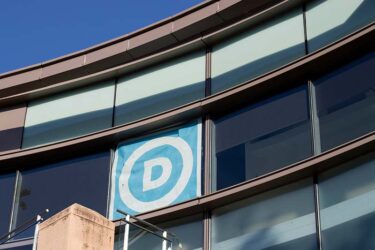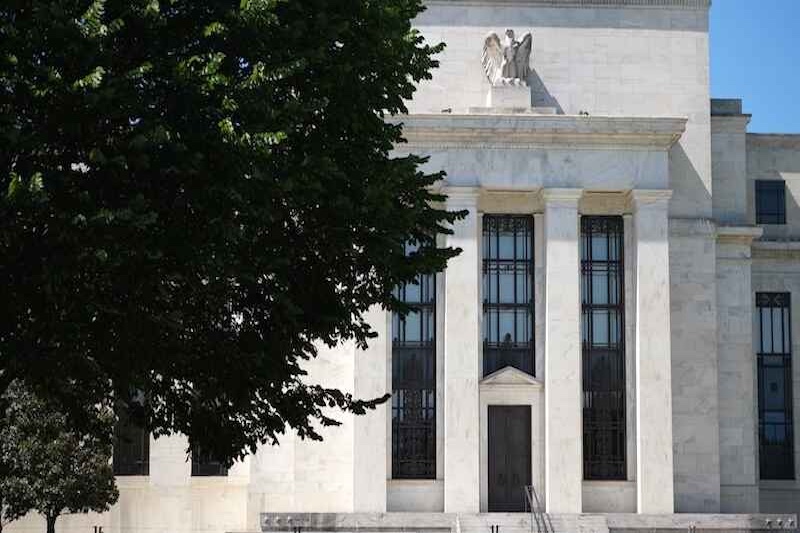Monday Takeaways: Markets Are Getting Political
Shah Gilani|August 19, 2024

We’ve got a big political week ahead of us.
Not only do we have the Democratic National Convention kicking off in Chicago… but we also have FOMC notes being released on Wednesday… followed on Friday by a speech from Jerome Powell.
All signs point to rate cuts just before the election in November.
As you might expect, it could all have a big impact on the markets…
In addition, we’ve got some key earnings coming up. They should give us a look at how the American consumer is feeling right now.
Get all the details in your Monday Takeaways.
Click on the thumbnail below to watch.
Transcript
Hey, everybody. Shah Galani coming to you with your Monday Takeaways, wearing my favorite Tunaskin shirt.
Love it. Love Tunaskin products because their clothes are made from recycled plastic from the world’s oceans. Tunaskin. Check it out. Good for you. Good for the planet.
Speaking of good for the planet, last week was a great week for the market.
On the heels of a crazy tumultuous week before, markets were stellar in the rebound sense.
S&P 500 up 3.9 percent last week. That’s the best week of the year.
Nasdaq Composite up 5.3 percent.
Best week of the year.
Wow. Talk about a bounce.
Just wanna give you guys a takeaway that you may not get anywhere else as to what happened because I wanna dispel something that a lot of people leaned on, which was a narrative that surfaced a few months ago that, oh my gosh, all these companies are spending so much on AI that it’s unlikely they’re gonna monetize their investments or CapEx in AI for years and years to come. So, supposedly, that’s what, since July, started knocking down the big mega cap tech names, which got everyone worried that, oh my gosh, maybe they’ve been overvalued based on this AI narrative, which now seems to be getting debunked because they’re overspending. Guess what, people?
That made reasonable sense. That’s sometimes the power of a narrative, except that wasn’t really what was happening.
We know now, in hindsight, what was really happening was as chatter about the Bank of Japan wanting to raise rates, the big money smart traders who recognized that forward guidance by Bank of Japan who had levered themselves up on the yen carry trade that’s borrowing in yen because interest rate on yen-based products in Japan and Japanese bonds, if you will, super cheap. So traders were selling yen to buy dollars because that’s how currency works. And with the dollars, they were buying Magnificent Seven stocks. That’s a leveraged trade.
As the Bank of Japan was threatening to raise rates, the smart money traders – big giant traders, hedge funds – were selling off their positions. They were covering their short yen positions, buying the yen back with dollars, and unloading their Magnificent Seven positions. That’s really what was knocking the Mag Seven down. Not that “AI is gonna take forever to monetize” narrative, which the media, the transmission was pretty widespread throughout the financial media.
And I was reading about it everywhere. I said, that doesn’t make sense because the big Mag Seven stocks, they’ve got so much money, cash – Tesla aside – in terms of the AI spend, but they have so much money, generate so much cash. This doesn’t really make sense, but that’s the narrative that we were tapping into. What was really happening, we know now, is the yen carry trade was being unwound by traders who weren’t announcing it, but they were selling down their positions.
Then what happened was the Bank of Japan did raise, and we had a crash in that yen carry trade where investors pretty much got margin calls on their short yen position because the value of the red yen popped. And what did they do? They had to cover their short yen positions and sell their Mag Seven. So, bang, we had this tremendous drop in the and everybody panicked.
Now I think what we know is it was the yen carry trade all along. It wasn’t that these big mega cap tech companies were having problems, because they really weren’t. And then now we see, “Oh, wait a second…” Buy the bounce.
Buy the dip.
Yen carry trade getting unwound back and Japan saying, “No, we’re not gonna raise rates anymore. We didn’t realize we’re gonna cause a global meltdown.”
So people got back to buying now on sale, Mag Seven stocks. That’s really what happened. That was the sell-down based on a false narrative based on, oh, there’s a recession coming, and we’re gonna have maybe a hard landing. Look at the labor market.
It’s getting really soft really quickly. And, there were, of course, crazy calls by knuckleheads for an emergency 50 basis-point cut before the September meeting by the Fed. Okay. So now we can pretty much debunk a lot of that stuff because things are looking better, period.
That’s a big takeaway from what happened. So you understand that where we are now, to me, is okay. This is a buy the dip moment because what really caused the dip was a particular kind of trade that was getting unwound. It wasn’t that things were bad in terms of earnings for the big mega caps.
It wasn’t that things were bad in terms of the economy. Maybe they are softening. So what? But we’re not in a recession.
So those fears are quickly abated, and the markets bounce. But they bounce for other reasons too.
Now I’m gonna give you a couple of other takeaways… They’re bouncing because of politics.
And maybe we don’t realize it and you don’t realize it, but generally speaking, no one’s talking about it. But this Democrat administration, the Biden-Harris administration, nature of the media, that a positive spin is being put on a the economy and helping markets by what? Well, for one thing, the Janet Yellen-led treasury, a democrat running the treasury for a democrat administration, has been not-so-subtly reissuing and issuing debt, and reissuing, refinancing government debt with t-bills a lot more than with coupon bonds.
Selling a lot fewer five-, seven-, ten-year coupon bonds for fear of investors not wanting to buy them and the yields spiking and people freaking out.
No. Instead of reissuing those types of maturities, they’ve been refinancing and financing the debt with a lot more t-bill issuance, which doesn’t show up, doesn’t put pressure on the sale of coupon bonds. That’s a political move, to be sure, and as reflected in the lower yields because there’s not much being offered. And if you’re an institution that needs to buy certain maturities, you buy them in the secondary market, which helps bring the prices up and the yields down.
Very political. Another political move that people maybe have missed is the strategic petroleum reserve is now down to a 41-year low because the Biden administration has been tapping the reserve to help keep the price of gas down.
We would have thought that petroleum prices maybe would have spiked with potential conflict – with ongoing conflict and potential wider conflict in the Middle East. No. Oil prices have been coming down. Now you know why. Because the strategic reserve has been tapped incessantly to keep oil prices down, to keep gas prices down in the United States. And hats off to them. They’ve done a pretty good job.
Politics. Another piece of politics coming up, the FOMC minutes we’re gonna get on Wednesday from the July meeting. And I think, though the decision was unanimous to hold rates, I think we’re gonna read within the minutes. There is probably some dissension even though they voted unanimously, and there’s probably gonna be talk within those minutes we’re gonna find out about future cuts. So that’s probably a positive. But the other positive is gonna come at the end of the week, I think, because Jerome Powell is speaking on Friday at 10 AM eastern time. The Federal Reserve’s annual symposium is going on in Jackson Hole from the 22nd to the 24th.
The title of the symposium is “Reassessing the Effectiveness and Transmission of Monetary Policy.”
Effectiveness, I guess we can understand pretty readily what that might means. Transmission, what does that mean?
Reassessing the effectiveness and transmission of monetary policy. Transmission, people, is forward guidance.
And forward guidance is something that the Fed has done fairly recently in order to move rates without having to physically move them by doing open market operations, by jawboning, by basically telling us – telling markets – what they intend to do longer term out. That’s forward guidance. That’s transmission of monetary policy into the public so that lenders and borrowers and capital markets participants understand where the Fed is likely to go so they don’t get surprised.
So if that’s the subject of this year’s annual symposium in Jackson Hole and chairman Powell speaks. His address to the symposium is on Friday at 10 AM Eastern Standard Time.
I’m betting through the prism of politics, he’s gonna talk about transmission and transmit that the Fed is now starting on a path to cut rates, to normalize.
He’s gonna use that as a transmission point.
That’s political because he wants to lower rates before this election to support his Democrat administration that has kept him on. Yes. He was brought on by Trump, but he’s been kept on. And now he’s serving this administration, and I think cuts are likely coming. All that being said, all supported for the market. The takeaway from that that more issuance of t bills, tapping the strategic petroleum reserve, the Federal Reserve likely to transmit that they’re going to begin a rate cutting cycle, all positives for the market, which are hopefully positives for the Democrat party whose national convention starts today.
Wow.
Politics.
Wish we had free markets, but we don’t.
So that’s the takeaway from last week and what’s happening this week and how to interpret it because I think it’s bullish because that’s the way it’s teed up. Couple of things we have they need to understand is this week, we have Wednesday. We got the FOMC minutes from the July meeting.
We have some retail numbers. We said retail earnings. We’re winding down on, second quarter retail reports, earnings reports, and retail comes we got a couple of retail names coming out this week. We got Lowe’s coming out on Wednesday.
Home Depot didn’t do so well earnings wise. I don’t expect Lowe’s to because stuff that people are doing for their homes. Well, there’s there’s not a great push towards that right now. So I’m not so sure that Lowe’s are gonna have great numbers.
If they do, people are gonna say, rah rah. Look. Consumers are out there fixing their homes. They’re spending.
What’s more important, I think, also coming this week, we’ve got Target and TJX companies on Wednesday. Target’s a big one. TJX is also big. Speaks to the consumer where they’re spending, what they’re spending on.
And if those numbers are really good and forward guidance is good, investors are gonna go, look. Consumer’s still spending. We already know that from last week’s retail sales that they’re spending. Okay?
So if we see more of that in the retail transmission of earnings, then I think there’s gonna be a positive there that things yes. Maybe the economy is cooling, but it’s certainly not crashing. And then on Thursday, we got Ross Stores and Dollar Tree. So, again, we’ll see where the consumer’s spending, whether they’re downgrading their spending or if they’re spending more or less.
So it’s gonna be, I think, an interesting week in terms of retail earnings and where the consumer is because last week, consumer looked pretty good. And at the end of the week, we got the University of Michigan sentiment, and that came out better than expected.
The last thing I wanna say about that is I never knew until last week’s report on University of Michigan sentiment survey that they divide the survey up into Democrats and Republicans. So they’re asking the survey respondents whether they’re Democrats or Republicans.
I never knew that. What was interesting about the breakdown of the report is we found that the net positive move higher in sentiment resulted from the Democrats.
The Democrat respondents markedly increased their optimism, but while the Republican respondents dipped. Their optimism dipped.
But so many Democrats – too many Democrat respondents – responded positively that they were more optimistic about the direction of the economy that it flipped the number higher.
Wow. That tells us something.
Politics. Alright? Is it that Harris is gonna be so much better than Biden? Is it that, “Thank goodness, Biden’s out because he wasn’t going to win? And now we have a chance as Democrats to see our candidate win?”
Is that whether their optimism comes? Probably. So, again, we’re back to politics. It’s gonna be a political week because of the Democrat convention.
Gonna be a lot of stuff going on. It’s in Chicago. Last time there was a Chicago convention, 1968. Didn’t go so well.
We’ll see. It’s going to be an interesting week. It always is. So your basic general takeaway is I gotta believe that this buy the dip opportunity is going to persist, and I think we can see markets continue higher because of politics, because of what’s going on, what’s what’s already been going up, and because now we’ve turned to face the future of monetary policy. And the transmission this week from Jackson Hole is likely to be we’re gonna start cutting. Those are your takeaways for this week.
Still, be safe out there. I’ll catch you guys next week. Cheers.

Shah Gilani
Shah Gilani is the Chief Investment Strategist of Manward Press. Shah is a sought-after market commentator… a former hedge fund manager… and a veteran of the Chicago Board of Options Exchange. He ran the futures and options division at the largest retail bank in Britain… and called the implosion of U.S. financial markets (AND the mega bull run that followed). Now at the helm of Manward, Shah is focused tightly on one goal: To do his part to make subscribers wealthier, happier and more free.



